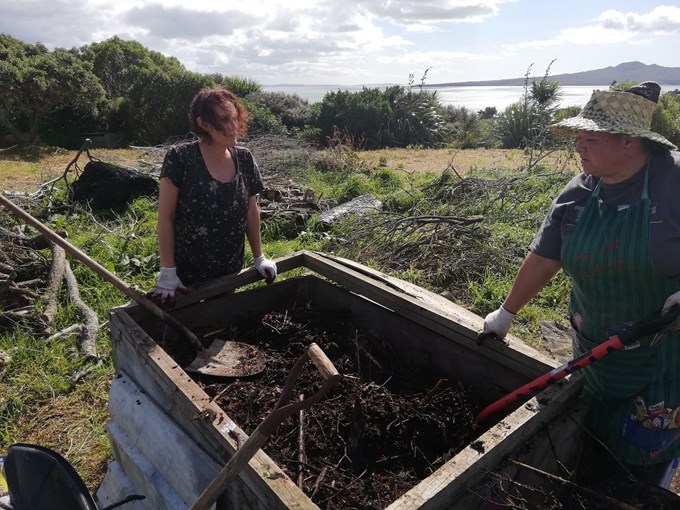When Beronia Scott first started adopting a para kore (zero waste) approach at Ōrākei Marae, her focus was on transforming the whare kai (kitchen), where she was in charge.
Nearly 15 years later, and with the support of an Auckland Council Waste Minimisation and Innovation Fund (WMIF) grant, the kitchen is now zero waste and they have closed the loop. They now turn kai into kai – taking para kai (food scraps) and using it to feed the soil to grow more great food.
“Our main goal was to first sort the marae out and our mahi here,” says Beronia. “We weren’t doing the right thing – a lot of food was going into the skip."
Sometimes we got rid of food through the Auckland City Mission, but we had bad practices. Then we were introduced to this idea of para kore.”
The WMIF grant enabled Beronia and Joanne Maihi continue their para kore journey beyond the kitchen – getting the composting systems up and running and developing the māra (garden).
“We decided we can’t stop because we’ve started and we have to keep going, so that’s when we in the kitchen had to come outside,” says Beronia.
Food Scraps make up 45 per cent of the average Aucklander’s household rubbish. Separating and composting our food scraps from general waste turns them into something useful and is great for our environment.
Joanne adds, “Taking the next step worked out to be a really good thing. We now purchase food ingredients, turn it into kai, watch people eat it, take the para kai, put it into bokashi or compost bins, use the para kai to enrich the soil, and then plant out seeds in the māra and watch more kai grow.”
The WMIF grant also provided funding for Para Kore workshops for whanau and manuhiri (guests) to the marae, based on Toa Para Wehi Wehi principles (auditing, advocating, teaching and sharing experiences).
“The grant has allowed us to continue our Para Kore journey, improve our systems, and change our whanau’s mindset. It’s about sharing the mātauranga (knowledge),” explains Joanne.
“This marae gets so many visitors and users each year. We inform and show them, this is the way we do it here now – we recycle, reduce, and reuse all of what comes through the kitchen. People see they can be part of it and take away what they have learnt here and make changes at their home or marae.”
Beronia says their processes have changed as whanau have become more accepting of their para kore practices. “We have worm farms, bokashi and compost bins, and use all three different ways of diverting food. We’ve also just created a hot compost system.” Bokashi is a Japanese composting system that pickles food scraps, including meat and dairy, which can then be dug into garden soil.
“We used to have lots of kai going to waste. I used to put heaps of food out, because that was the thing you did on a marae. You showed your mana by piling your tables up with food, which went to waste.”
Joanne says it took a few whanau hui, but people know now.
“We put out a sign, ‘You dish it, you eat it’. It reminds people to only grab what you can eat. And now our para kai is so much less.”
Beronia says with the reduction in food scraps from the whare kai, they introduced a ‘Swap a Bucket’ scheme for whanau to bring their para kai to help support the marae’s worm farm and māra. Some bring their buckets back, whereas others keep them for their own māra.
It is all part of the Toa Para Wehi Wehi programme they have, says Joanne. The marae has also distributed some of the worm farms for whanau to carry on their own para kore journey in their kāinga (homes).
“When we gave people the bokashi bins or worm farms for their homes, they started realising how much food they were wasting. Before, it would just get tipped in the bin. Now it is in their face., It’s good to watch the lightbulb moment, when they realise they cook too much food and waste too much,” she says.
Beronia and Joanne both understand the importance of adopting para kore practices and protecting Papatūānuku.
“We all talk about kaitiakitanga (guardianship) or being kaitiaki (guardians),” says Beronia. As Māori, we talk about kaitiakitanga, manaakitanga (taking care), awhi (help). We help our people change their whakaaro (mindset). If you are Māori, you have to do it, and if you are not Māori and live in Aotearoa, or on this planet, you have to do it. It just has to be done.
"You don’t have to be Māori to be a kaitiaki. We need to teach our children and we need to protect Papatūānuku.”
The next step for Ōrakei marae on their para kore journey will see the development of a ‘Marae Pataka’ – a place to distribute bulk food and their kai from the māra so whanau can reduce the impact of single use food packaging on the environment.
“There’s always something more to do,” says Joanne, “It’s great to look at the whole system to find where we can improve. I don’t think we will ever stop learning and improving our mahi.”
Have you got a great ‘zero waste’ idea?
If you’re a business, iwi/Māori, or an education or community group with a project that will help reduce the amount of waste sent to landfill, you could be eligible to apply.
Visit the WMIF application page, email Auckland Waste Fund, or call 09 301 0101 to find out more.


